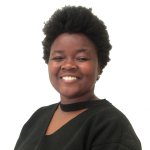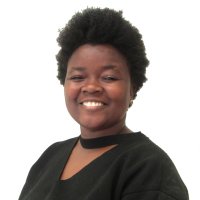
Fernanda Samuel
National Coordinator and Leader of the Mangrove Protection and Conservation Actions, NGO OTCHIVA
Biography
Fernanda Samuel, a prominent figure in Angola's environmental advocacy landscape, is a trailblazer in mangrove protection and conservation efforts through her work with the NGO OTCHIVA. Recognized on both national and international platforms, she has garnered acclaim for her dedication to preserving Angola's natural heritage.
Selected as a Finalist for the Young Champions of the Earth 2020 by the UN, Samuel's commitment to environmental stewardship has earned her widespread recognition. Her influence extends to the highest levels of government, as she was appointed by the President of the Republic of Angola as a Member of the Council of the Republic for environmental matters.
At the global level, Samuel's contributions have been acknowledged by the Ramsar Convention, which recognized her as a Young Wetland Champion of Wetlands in 2022 and appointed her as the voice of wetlands. Her tireless efforts are deeply rooted in her passion for the environment, which seamlessly intertwines with her personal and professional life.
Samuel's impact is felt far beyond boardrooms and policy meetings. She actively engages with communities, researchers, and volunteers on the ground, working hand in hand with fishing communities and OTCHIVA volunteers to restore mangroves and combat environmental degradation. Her holistic approach to environmentalism reflects her belief in the collective responsibility to safeguard the planet for future generations.
Reflecting on her journey, Samuel acknowledges the support of mentors, colleagues, and volunteers who have propelled her work forward. She remains committed to amplifying the voices of communities and advocating for robust environmental policies that address pressing issues such as plastic pollution, deforestation, and climate change.
Looking ahead, Samuel envisions a future where Angola's rich biodiversity is preserved through concerted efforts across sectors. She emphasizes the importance of environmental education, public policies, and community engagement in shaping a sustainable future. With her unwavering dedication and vision, Samuel continues to inspire change and make a lasting impact on Angola's environmental landscape.
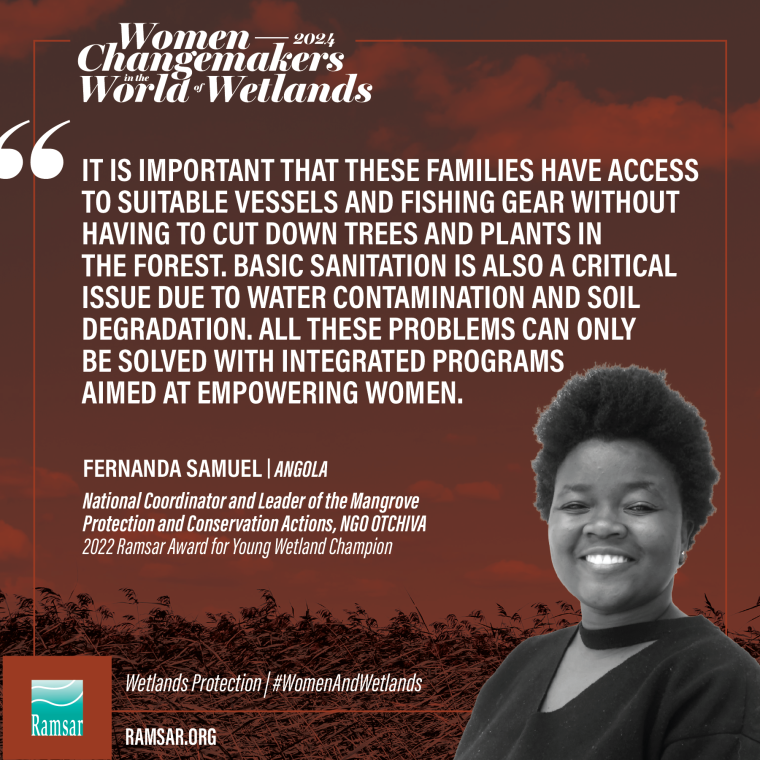
Questions and Answers
What personal experience has shaped or inspired your journey?
I made the decision to commit to protecting wetlands in 2016 when I realized that flamingos were disappearing from my hometown, Lobito, on the south coast of Angola. I grew up by the sea surrounded by mangroves and enchanted by the flamingos, my city's calling card. Suddenly new construction companies arrived and started depositing rubble and making landfills for the construction of new housing and tourist developments. The mangroves were destroyed, the flamingos disappeared and I panicked.
That was what opened my eyes to join my childhood friends on this unstoppable journey to save the mangroves, a flamingo sanctuary.
Who is the influential figure who has inspired your actions, and what specifically about them has been motivating?
Wangari Maathai, of Kenya, the first African woman to receive the Nobel Peace Prize. Maathai founded the Green Belt Movement, an environmental non-governmental organization focused on tree planting, environmental conservation, and women's rights. I never had the honor of meeting this remarkable political, social, and environmental activist in person because she died very early. But in 2021, during COP 26 in Glasgow, Scotland, I had the opportunity to become friends with his daughter and heir to noble causes Wanjira Mathai, vice-chairwoman of WRI - World Resources Institute.
In your conservation efforts for wetlands, what key challenges did you face and how has this experience fuelled your dedication to making a positive impact?
The biggest challenges I faced in my fight to conserve and restore wetlands were threats from powerful businessmen protected by politicians who razed vast areas of mangroves and displaced fishing communities. They wanted to be the owners of the best land along the coastal sea. They only thought about profit. They were not concerned about mangrove ecosystems or the livelihoods of artisanal fishermen. They even used the police to intimidate us. Many of us lost our jobs.
I was fired from the Ministry of the Environment where I was a permanent employee. And I was threatened with death for going against the interests of powerful people. But I never gave up. The biggest motivation came from the young volunteers who were mobilized for the cleaning and reforestation campaigns in mangrove areas. Through our environmental education campaigns, artisanal fishermen realized that without mangroves there would be no fish, crustaceans, or shellfish. Therefore, they quickly learned new techniques for sustainable management of marine resources and joined our cause by denouncing companies that deposited garbage and debris on the beaches. This is how we managed to mobilize the media and create the first organized groups of mangrove guardians, made up of young members of communities living along the seafront. These actions had a positive impact and raised the awareness of politicians. Finally, they realized that protecting mangroves helps fight hunger and poverty.
All women in this category: Wetland Protection
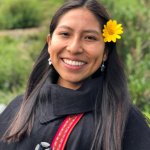
Dayana Blanco Quiroga
Co-founder of the Uru Uru Team
More information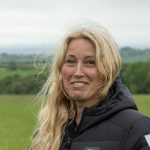
Sacha Dench
Founder of Conservation Without Borders Ambassador for the UN Convention on Migratory Species.
More information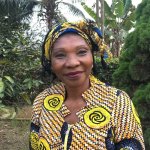
Cecile Ndjebet
Founder Cameroon Ecology, and Co-founder African Women’s Network for Community Management of Forests.
More information